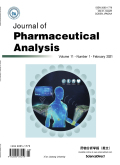首页|期刊导航|药物分析学报(英文)|Paeoniflorin ameliorates chronic colitis via the DR3 signaling pathway in group 3 innate lymphoid cells
Paeoniflorin ameliorates chronic colitis via the DR3 signaling pathway in group 3 innate lymphoid cells
Shaowei Huang Qing Wang Jinyan Chen Yanyang Li Lian Zhou Xia Luo Xueqian Xie Bo Xu Zengfeng Pan Junjie Liang Meiling Zhang Simin Pan Xiaojing Wang Meng Zhao
药物分析学报(英文)2024,Vol.14Issue(6):889-901,13.
药物分析学报(英文)2024,Vol.14Issue(6):889-901,13.DOI:10.1016/j.jpha.2024.01.008
Paeoniflorin ameliorates chronic colitis via the DR3 signaling pathway in group 3 innate lymphoid cells
Paeoniflorin ameliorates chronic colitis via the DR3 signaling pathway in group 3 innate lymphoid cells
摘要
关键词
Paeoniflorin/Ulcerative colitis/Intestinal mucosal barrier/DR3 signaling pathway/Group 3 innate lymphoid cellsKey words
Paeoniflorin/Ulcerative colitis/Intestinal mucosal barrier/DR3 signaling pathway/Group 3 innate lymphoid cells引用本文复制引用
Shaowei Huang,Qing Wang,Jinyan Chen,Yanyang Li,Lian Zhou,Xia Luo,Xueqian Xie,Bo Xu,Zengfeng Pan,Junjie Liang,Meiling Zhang,Simin Pan,Xiaojing Wang,Meng Zhao..Paeoniflorin ameliorates chronic colitis via the DR3 signaling pathway in group 3 innate lymphoid cells[J].药物分析学报(英文),2024,14(6):889-901,13.基金项目
This work was supported by the National Natural Science Foun-dation of China(Grant No.:82074092),Natural Science Foundation of Guangdong Province,China(Grant No.:2021A1515012219),and Guangzhou University of Chinese Medicine"Double First-Class"and High-level University Discipline Collaborative Innovation Team Project,China(Grant No.:2021 xk81),and Graduate Research Inno-vation Project of Guangzhou University of Chinese Medicine,China.Finally,we appreciate the School of Basic Medicine,Guangzhou University of Chinese Medicine for technical support. (Grant No.:82074092)

